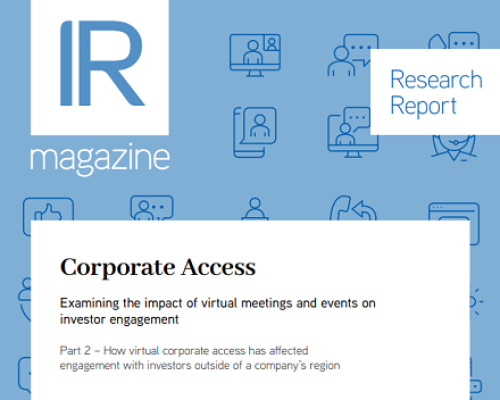IR teams could be preparing senior management more actively for private and public investor events by tracking each question asked, according to research from Harvard Business School.
The type of questions that are put to management vary depending on whether they’re asked in public or private and whether they’re asked by shareholders or non-holders.
‘There’s some degree of predictability to these questions,’ Eugene Soltes, associate professor of business administration at Harvard Business School and co-author of the research, tells IR Magazine. He adds that if IR professionals actively tracked every question that was asked in investor meetings, rather than just the highlights, they could observe patterns that would help them screen for which meetings are high value and better prepare management for scheduled meetings.
Soltes’ research examined more than 1,200 questions asked during private meetings at two publicly listed companies. A researcher –an experienced IR professional – sat in on all of the private meetings and recorded the questions asked.
Soltes consulted various sources, including several IR professionals and NIRI, to group the questions into the following five categories:
- Questions asking for greater depth about information that is already public – for example, will a new product be produced in the same plant as existing products?
- Questions about management’s philosophy – for example, what keeps you up at night?
- Questions seeking public information more efficiently – for example, can you tell me about the level of share ownership held by senior management?
- Questions seeking managers’ feedback on proprietary ideas and investment theses – for example, what looks more attractive right now: M&A activity or share buybacks?
- Questions of a timely nature – for example, what are your current cash holdings?
The first category of questions is seen as the most straightforward for management to answer, while the final category is more probing and could potentially raise issues about breaches of Regulation FD.
Private versus public meetings
In public meetings, such as earnings calls, management is more likely to face softball questions asking for greater depth about publicly available information, with 93 percent of public questions falling into this bracket, according to the research. This falls to 71 percent in private meetings, where questions about proprietary ideas, management philosophy and questions of a timely nature are more likely to come up.
Soltes says questions asked on earnings calls are more likely to come from the sell side and that, therefore, there is an element of performance that comes with it. ‘In private, people are much more critical of a company’s performance,’ he says. ‘A conference call is often just a conversation between management and an analyst – it’s a show. This underscores why private conversations are so important.’
| Type of question | Private interaction | Public interaction |
| Greater depth | 71 percent | 93 percent |
| Management philosphy | 6 percent | 2 percent |
| Investor efficiency | 3 percent | 0 percent |
| Proprietary ideas | 14 percent | 5 percent |
| More timely | 6 percent | 0 percent |
Source: What do investors ask managers privately?
Investors ask the most questions during private meetings and roadshows, according to the research. But roadshows also tend to provide longer interactions between investors and management so private meetings represent the most efficient meeting type for investors.
Shareholders versus non-shareholders in private meetings
In private meetings the questions are more likely to be of a timely nature and also negative in tone, according to the research. The willingness to ask a speculative or negative question depends on the nature and duration of relationship with the issuer.
Current holders ask 1.2 more forward-looking questions on average. Holders are more likely to ask these questions if they interacted with management in a private meeting the year before.
Investors that hold stock and meet more often with management are also 15 percent less likely to ask efficiency questions.
Private meetings with current holders are most likely to prompt trading activity, according to the research, although Soltes provides the caveat that there are many other variables that affect changes in shareholdings that aren’t measured in this research.
‘We find aggregate trading in a firm’s security is higher when more forward-looking questions are asked,’ he writes in the report. ‘Moreover, we find that when investors ask more forward-looking or negative questions during private interactions, they are more likely to increase or decrease their position in the firm over the quarter.’










